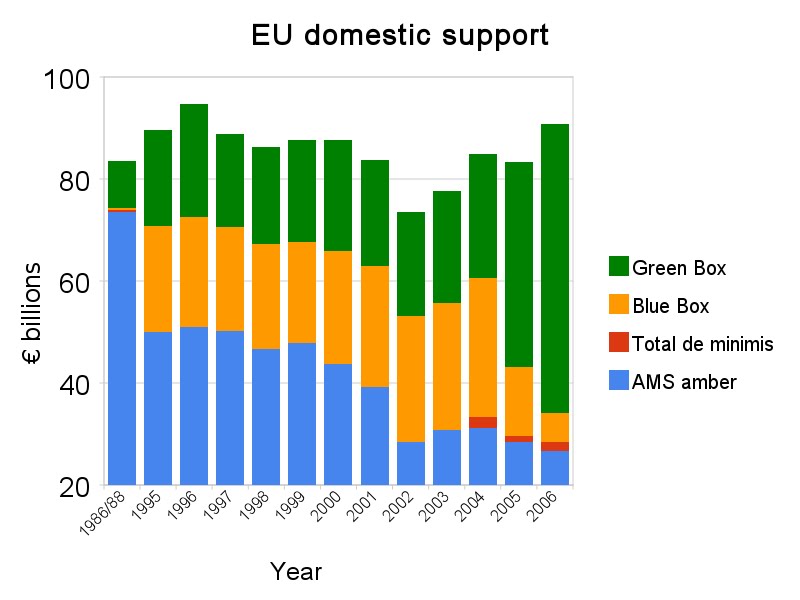This is the question that former OECD trade and agriculture supremo Stefan Tangermann poses in a recent issue of Agra Europe. In effect the answer that the agricultural economist gives is that they can’t be, although he is too canny to say that in so many words. But he takes each argument for the SFP in turn and demolishes it.
He points out that direct payments make up nearly three-quarters of EU expenditure on the CAP, equivalent to about one third of the Union’s total budget. The argument that they are compensation for earlier reforms can no longer be used to justify their continuation.… Read the rest
How can direct payments be justified after 2013?
This is the question that former OECD trade and agriculture supremo Stefan Tangermann poses in a recent issue of Agra Europe. In effect the answer that the agricultural economist gives is that they can’t be, although he is too canny to say that in so many words. But he takes each argument for the SFP in turn and demolishes it.
He points out that direct payments make up nearly three-quarters of EU expenditure on the CAP, equivalent to about one third of the Union’s total budget. The argument that they are compensation for earlier reforms can no longer be used to justify their continuation.… Read the rest
CAP support levels reach new high
CAP subsidies as reported to the WTO reached a ten-year high of over €90 billion in the 2006/07 marketing year, but conveniently most of them have been parked in the allegedly non trade distorting green box, something that has provoked disquiet in Geneva. The EU notified €90.7 billion of support to the global trade body for 2006/2007 – up from €75.6 billion in 2002, when support was at its lowest in the last fifteen years.
More from ICTSD.… Read the rest
The NFU perspective on the future of the CAP
Britain’s National Farmers’ Union is noted for its strategic, long-term view of agricultural issues. Its officials have a sophsiticated, well informed view of developments and it was therefore interesting to read an interview in the latest edition of Farmers Weekly with the NFU’s head of economics and international affairs, Tom Hind. He was at one time acting head of the NFU’s office in Brussels.
Not surprisingly, he takes the NFU line that farmers need to continue to receive the single farm payment (SFP) to give them a degree of income stability, especially faced with volatile markets. A basic tenet of agricultural economics is that markets for farm commodities are relatively unstable: to put it at its simplest, even with modern agronomy, the weather remains a factor which can disrupt such markets.… Read the rest
Scotland ‘on message’ on farm subsidies
Scotland is far more in tune with current thinking on farm subsidies in mainland Europe than England and Wales, claims Scotland’s rural affairs minister Richard Lochhead. Addressing farmers at a Christmas Carcass competition in Inverurie, Mr Lochhead brought them glad tidings about the deep divide in agriculture policies on the two sides of the border. ‘My opinion on CAP reform is very different from DEFRA’s view that all direct subsidies should be removed and we should rely on a free market. Scotland should not go down that route and our thinking is much closer to the mainstream of Europe which is that the pendulum is swinging back towards support for active agriculture.’… Read the rest
Scotland 'on message' on farm subsidies
Scotland is far more in tune with current thinking on farm subsidies in mainland Europe than England and Wales, claims Scotland’s rural affairs minister Richard Lochhead. Addressing farmers at a Christmas Carcass competition in Inverurie, Mr Lochhead brought them glad tidings about the deep divide in agriculture policies on the two sides of the border. ‘My opinion on CAP reform is very different from DEFRA’s view that all direct subsidies should be removed and we should rely on a free market. Scotland should not go down that route and our thinking is much closer to the mainstream of Europe which is that the pendulum is swinging back towards support for active agriculture.’… Read the rest
G-21 an anti-reform bloc?
At various times in the history of the CAP, member states have formed informal groupings to address particular issues, e.g., ‘the Aachen Five’ and the agri-monetary system. The G-21, in effect led by France, is a much larger grouping which constitutes a qualified majority in the Council. It become the G-21 rather than the G-20 at a meeting in Vienna when Greece joined. This left only the four leading reform countries (UK, Denmark, Netherlands, Sweden) outside the grouping, plus Cyprus and Malta – countries that have small farm sectors and may not have thought it worth the time and effort.… Read the rest
Budget directorate wants to cut CAP
Leaked copies of a document from the European Commission’s budget directorate reveal an aspiration to substantially cut agriculture’s share of the EU budget from 2013 onwards.… Read the rest
Dairy sector measures do not set pulses racing
4000 dairy farmers with 900 tractors demonstrated outside an EU agricultural ministers meeting in Luxembourg yesterday calling for more aid for the sector. Inside, ministers faced a Franco-German memorandum backed by 20 member states with a series of demands for market distorting measures. In the event the concessions the Commission made are probably the least they could have got away with in the circumstances. Farmers’ organisation COPA immediately condemned them as insufficient.… Read the rest
UK watchdog slams farm payments mess
In one of its most critical ever reports, the National Audit Office has slammed the way in which the Rural Payments Agency has administered Single Farm Payments to farmers. It accused the agency of showing ‘scant regard to protecting public money’. The agency has wasted around £700m, the capital equivalent of building thirty secondary schools.… Read the rest

